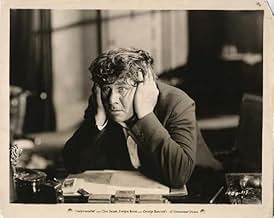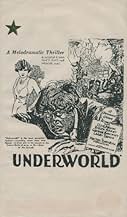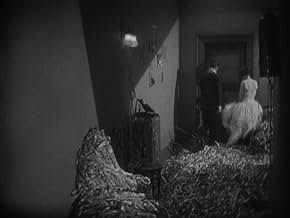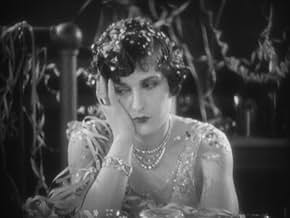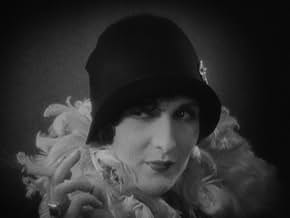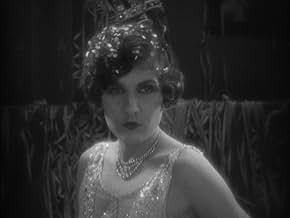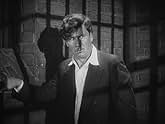AVALIAÇÃO DA IMDb
7,5/10
3,7 mil
SUA AVALIAÇÃO
Adicionar um enredo no seu idiomaBoisterous gangster kingpin Bull Weed rehabilitates his former lawyer from his alcoholic haze, but complications arise when he falls for Weed's girlfriend.Boisterous gangster kingpin Bull Weed rehabilitates his former lawyer from his alcoholic haze, but complications arise when he falls for Weed's girlfriend.Boisterous gangster kingpin Bull Weed rehabilitates his former lawyer from his alcoholic haze, but complications arise when he falls for Weed's girlfriend.
- Direção
- Roteiristas
- Artistas
- Ganhou 1 Oscar
- 5 vitórias no total
Alfred Allen
- Judge
- (não creditado)
Shep Houghton
- Street Kid
- (não creditado)
Andy MacLennan
- One of Laughing Faces at the Ball
- (não creditado)
Ida May
- Laughing Woman at the Ball
- (não creditado)
Karl Morse
- 'High Collar' Sam
- (não creditado)
Bob Reeves
- Detective at Railroad Station
- (não creditado)
Julian Rivero
- One of Buck's Henchmen
- (não creditado)
Avaliações em destaque
Bull Weed is a boisterous gangster bank robber. His girlfriend is the flashy Feathers McCoy. His rival is Buck Mulligan. Wensel is a vagrant but he's no snitch. He's a Rolls Royce of silence. Bull gives Rolls Royce a thousand bucks and makes him a partner in crime. Using Rolls Royce's brains, Bull becomes even more successful. At a wild party, Buck attacks Feathers and an angry drunken Bull kills him. Bull is sent to prison. Feathers convinces Rolls Royce to run away with her but she changes her mind to break him out of prison.
This is a great pre-Depression era gangster movie. It has the classic gangster style and characters. It's a silent movie that lays out the genre that would explode a few years later. This is one in a line of developments in the gangster genre.
This is a great pre-Depression era gangster movie. It has the classic gangster style and characters. It's a silent movie that lays out the genre that would explode a few years later. This is one in a line of developments in the gangster genre.
I am not a big fan of the gangster film; when I am in the vicinity of the crime drama I always gravitate towards noir, where the moral lesson reserved for our protagonist in crime is not simply a present awareness that this life was only paid back with suffering but a deeper glimpse of the entire karmic process that produces a life of suffering.
In a gangster film this lesson is expressed in one of two ways; the protagonist is either left a broken, doomed being whose tragic fate is envied by no one, or is purged in the fire and brimstone of a final violence. So although we have watched secretly fascinated at the social fabric in ruins, it is important, in both respects, that we leave the theater restored in ethical order. We thus assume the role of the despised public enemy; his fate is ours for having indulged the antisocial fantasy. The final taste is always gingerly bitter, and works when it does because we invested so much of ourselves in the wrong side of the fence.
So you may hear of this as a milestone in the evolution of this type of film, and it's all because of the finale. It is this cathartic vision of some urban mid-station on the road to limbo where, amid a pall of gunsmoke and broken shards of brick wall, our protagonist comes to realize folly and is purged from life almost as a hero.
It is important to note that he doesn't go out all guns blazing, but rather surrenders to the cops. He will face death, but will not be even momentarily martyred on screen; what is heroic about him, so properly old fashioned, is that he honorably extricates from his bloody fate the innocent.
You can't miss any of this if you're a fan of the gangster genre. Scarface - the original - was built on this.
There are a few other instances that exert some cinematic intrigue; the fast-cutting of faces, superimpositions, shadows across walls. But it does not match the more interesting experiments going on in silent cinema of the time, or what this man would be doing the following year.
What is so apt about all of this is the smoky, drowsily anxious mood, the sense of excited weariness at the prospect of danger. There is a brawl in what only 30 years before would have been called a saloon. It's called the 'Dreamland Cafe', and just outside a neon sign reading 'The City is Yours' flashes the grinning mobster and his moll.
In a gangster film this lesson is expressed in one of two ways; the protagonist is either left a broken, doomed being whose tragic fate is envied by no one, or is purged in the fire and brimstone of a final violence. So although we have watched secretly fascinated at the social fabric in ruins, it is important, in both respects, that we leave the theater restored in ethical order. We thus assume the role of the despised public enemy; his fate is ours for having indulged the antisocial fantasy. The final taste is always gingerly bitter, and works when it does because we invested so much of ourselves in the wrong side of the fence.
So you may hear of this as a milestone in the evolution of this type of film, and it's all because of the finale. It is this cathartic vision of some urban mid-station on the road to limbo where, amid a pall of gunsmoke and broken shards of brick wall, our protagonist comes to realize folly and is purged from life almost as a hero.
It is important to note that he doesn't go out all guns blazing, but rather surrenders to the cops. He will face death, but will not be even momentarily martyred on screen; what is heroic about him, so properly old fashioned, is that he honorably extricates from his bloody fate the innocent.
You can't miss any of this if you're a fan of the gangster genre. Scarface - the original - was built on this.
There are a few other instances that exert some cinematic intrigue; the fast-cutting of faces, superimpositions, shadows across walls. But it does not match the more interesting experiments going on in silent cinema of the time, or what this man would be doing the following year.
What is so apt about all of this is the smoky, drowsily anxious mood, the sense of excited weariness at the prospect of danger. There is a brawl in what only 30 years before would have been called a saloon. It's called the 'Dreamland Cafe', and just outside a neon sign reading 'The City is Yours' flashes the grinning mobster and his moll.
'Underworld' is the second film of Josef von Sternberg recently seen. The other being 'The Docks of New York'. Although 'Underworld' is the more historically significant of the two films, being the first gangster film and one of the earliest film noir-like films, there is a preference for 'The Docks of New York'. Both are very, very good films though. Sternberg was a fine director, evident in his collaborations with Marlene Dietrich, and George Bancroft deserves a lot more credit as an actor.
As said, 'Underworld' is a very good film. It is not one of Sternberg's best, do prefer the likes of 'Shanghai Empress', 'The Blue Angel', 'The Scarlet Empress' and 'The Devil is a Woman'. It is incredible though that this is only his third solo film, well technically the fifth but two are lost, and his distinctive style seemed not only obvious throughout but fully established, one does not usually that with directors at this early a stage, so 'Underworld' was something of an achievement.
Is 'Underworld' perfect? No as two scenes didn't quite work for me. One was the prison break sequence, which lacked the necessary tension and felt choppily staged.
The other was the ending, after the exciting shoot out it then ends on a tacked on note that is too at odds with what came before and came over as a little heavy-handed as well.
Sternberg's direction though is truly impressive, one does not expect to see direction this polished, visually beautiful or taut at such an early career stage suggestive of a director who had actually been in the profession for years beforehand (that's a compliment by the way). What immediately stands out is the production values, the settings are evocatively seedy yet made oddly attractive at the same time and the cinematography has great audacious style and gritty atmosphere. Sternberg's films always had great use of light and shadow and 'Underworld' is no exception. The music is suitably haunting.
Other than two scenes, the story was riveting with a suitably pull no punches atmosphere, some exciting moments (especially the climactic shoot-out, which is why it's a shame that how it's resolved disappoints) and some nice turns that stopped it from becoming predictable without it becoming confusing. The central relationship to me was handled fine. The performances likewise, with Bancroft showing again with his intensity that he is deserving of more credit. Clive Brook shows here how his acting grew significantly from when he first started and Evelyn Brent is charming.
Concluding, very good. 8/10
As said, 'Underworld' is a very good film. It is not one of Sternberg's best, do prefer the likes of 'Shanghai Empress', 'The Blue Angel', 'The Scarlet Empress' and 'The Devil is a Woman'. It is incredible though that this is only his third solo film, well technically the fifth but two are lost, and his distinctive style seemed not only obvious throughout but fully established, one does not usually that with directors at this early a stage, so 'Underworld' was something of an achievement.
Is 'Underworld' perfect? No as two scenes didn't quite work for me. One was the prison break sequence, which lacked the necessary tension and felt choppily staged.
The other was the ending, after the exciting shoot out it then ends on a tacked on note that is too at odds with what came before and came over as a little heavy-handed as well.
Sternberg's direction though is truly impressive, one does not expect to see direction this polished, visually beautiful or taut at such an early career stage suggestive of a director who had actually been in the profession for years beforehand (that's a compliment by the way). What immediately stands out is the production values, the settings are evocatively seedy yet made oddly attractive at the same time and the cinematography has great audacious style and gritty atmosphere. Sternberg's films always had great use of light and shadow and 'Underworld' is no exception. The music is suitably haunting.
Other than two scenes, the story was riveting with a suitably pull no punches atmosphere, some exciting moments (especially the climactic shoot-out, which is why it's a shame that how it's resolved disappoints) and some nice turns that stopped it from becoming predictable without it becoming confusing. The central relationship to me was handled fine. The performances likewise, with Bancroft showing again with his intensity that he is deserving of more credit. Clive Brook shows here how his acting grew significantly from when he first started and Evelyn Brent is charming.
Concluding, very good. 8/10
The stars are beautifully photographed; the lighting sets the mood, and Ben Hecht's Academy Award winning screenplay all combine to make this the definitive "gangster picture", done before many of the elements became cliches.
In a way, I suppose this film simply managed to push all the right buttons so far as I was concerned. The basic theme of conflicting love and loyalty is one that has always called to my heart, and the central trio of characters happen to tap into stereotypes of instant appeal: gentle, honourable intellectual - sharp-witted and independent beauty - and brash, brave brute of a bully, as intemperate in his passions as in his lack of taste, and yet not wholly without merit.
But while the initial premise may benefit from join-the-dots attraction, it is the performances and execution of the film that give it its power. All three principals do an outstanding job. Clive Brooks, as the educated man brought low by drink and redeemed by the casual generosity of a gangster, makes use of every shading of expression in a sensitive face, conveying more with fewer words in one glance than anyone else in the cast. His scenes with 'Feathers' are a tour-de-force. Despite his reticence, it's easy to credit that he is not only the most intelligent but - with the ironic vulnerability of the civilised man amidst those who live by tooth and claw - the most idealistic character in the film. Having thrown his lot in with criminals, he does the best he can to keep faith; but his eyes betray everything he cannot say.
Evelyn Brent has perhaps the hardest task, that of raising the moll 'Feathers' into more than just an object of general desire and appendage to her man. From her very first scenes - where she publicly adjusts her garter beneath the thigh-skimming hem of her dress - she radiates allure. But she also comes across as more perceptive and quick than her consort, and far more collected and self-contained. It's not hard to understand her roving eye when she meets a man more intriguing than Bull Weed, the jovial vulgarian who maintains her in the lap of luxury; but it is to the credit of George Bancroft, as 'Bull Weed', that we also sympathies with her reluctance to leave her protector in the lurch when she has the chance.
My admiration for Bancroft's acting gradually increased throughout the film. At the beginning he comes across as little better than a ham, gesturing over-widely and falling into uproarious laughter that is a little too loud and a little too long. But as time progresses it becomes evident that it is not the actor but the gangster himself who is playing a larger-than-life role, and when Bull Weed's defences slip we start to see the limited, confused man behind the act. Striding drunkenly for revenge, he transcends his humanity to become a lurching, elemental force. In court he shrinks to an uncomprehending ox of a man, all swagger gone. And finally, in perhaps Bancroft's finest achievement of all, with no audience left to play to but the shadows, Bull Weed in his betrayal becomes merely human, sinking back into the pretension-free gutter from which he must once have climbed. His last scenes carry a conviction and depth of character on which the success of the film ultimately rests, and which would have been all but unthinkable at the start.
Besides all this, the film itself is quite simply beautiful; beautifully made, beautifully lit, beautifully shot. It's no wonder that it was a smash hit by word of mouth, nor that it still stands up today, where the use of cruder sentiment or melodrama might long since have reduced it to the status of mere historical curiosity.
But while the initial premise may benefit from join-the-dots attraction, it is the performances and execution of the film that give it its power. All three principals do an outstanding job. Clive Brooks, as the educated man brought low by drink and redeemed by the casual generosity of a gangster, makes use of every shading of expression in a sensitive face, conveying more with fewer words in one glance than anyone else in the cast. His scenes with 'Feathers' are a tour-de-force. Despite his reticence, it's easy to credit that he is not only the most intelligent but - with the ironic vulnerability of the civilised man amidst those who live by tooth and claw - the most idealistic character in the film. Having thrown his lot in with criminals, he does the best he can to keep faith; but his eyes betray everything he cannot say.
Evelyn Brent has perhaps the hardest task, that of raising the moll 'Feathers' into more than just an object of general desire and appendage to her man. From her very first scenes - where she publicly adjusts her garter beneath the thigh-skimming hem of her dress - she radiates allure. But she also comes across as more perceptive and quick than her consort, and far more collected and self-contained. It's not hard to understand her roving eye when she meets a man more intriguing than Bull Weed, the jovial vulgarian who maintains her in the lap of luxury; but it is to the credit of George Bancroft, as 'Bull Weed', that we also sympathies with her reluctance to leave her protector in the lurch when she has the chance.
My admiration for Bancroft's acting gradually increased throughout the film. At the beginning he comes across as little better than a ham, gesturing over-widely and falling into uproarious laughter that is a little too loud and a little too long. But as time progresses it becomes evident that it is not the actor but the gangster himself who is playing a larger-than-life role, and when Bull Weed's defences slip we start to see the limited, confused man behind the act. Striding drunkenly for revenge, he transcends his humanity to become a lurching, elemental force. In court he shrinks to an uncomprehending ox of a man, all swagger gone. And finally, in perhaps Bancroft's finest achievement of all, with no audience left to play to but the shadows, Bull Weed in his betrayal becomes merely human, sinking back into the pretension-free gutter from which he must once have climbed. His last scenes carry a conviction and depth of character on which the success of the film ultimately rests, and which would have been all but unthinkable at the start.
Besides all this, the film itself is quite simply beautiful; beautifully made, beautifully lit, beautifully shot. It's no wonder that it was a smash hit by word of mouth, nor that it still stands up today, where the use of cruder sentiment or melodrama might long since have reduced it to the status of mere historical curiosity.
Você sabia?
- CuriosidadesThe film was predicted to be a flop, was shelved by Paramount and eventually released in only one theater in New York. Screenwriter Ben Hecht demanded that his name was taken off the credits. As a result of strong word-of-mouth the movie became an enormous hit and won Hecht the first of his two Academy Awards.
- Citações
'Bull' Weed: -There was something I had to find out - - and that hour was worth more to me than my whole life.
- ConexõesFeatured in The House That Shadows Built (1931)
Principais escolhas
Faça login para avaliar e ver a lista de recomendações personalizadas
- How long is Underworld?Fornecido pela Alexa
Detalhes
- Data de lançamento
- País de origem
- Idiomas
- Também conhecido como
- Underworld
- Locações de filme
- Empresa de produção
- Consulte mais créditos da empresa na IMDbPro
Bilheteria
- Faturamento bruto nos EUA e Canadá
- US$ 1.642.194
- Tempo de duração
- 1 h 20 min(80 min)
- Mixagem de som
- Proporção
- 1.33 : 1
Contribua para esta página
Sugerir uma alteração ou adicionar conteúdo ausente

